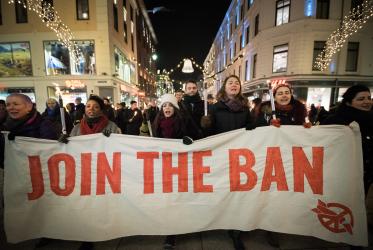More than 3,000 peacemakers from all over the world were gathered in Oslo on 10 December to commemorate the work of the International Campaign to Abolish Nuclear Weapon’s (ICAN) work with banners with slogans such as: "The world must sign UN nuclear ban."
ICAN received the Nobel Peace Prize for its ground-breaking efforts to secure a prohibition on nuclear weapons.
The celebration of the Nobel prize winner started at the Railway Square with music and political appeals before the torchlight march moved up a main road in Oslo to the Grand Hotel to great the newest Nobel laureate.
"I can, we did and we keep going," called Rebecca Johnson, leader of ICAN International, during one of the many cheers rallying for the world's leaders to get rid of all nuclear weapons.
The Nobel peace weekend in Oslo, Norway, gathered people and campaigners from all over the world in a combination of a grassroots and international movement.
The Nobel Peace Prize ceremony was held in the Oslo City Hall on Sunday 10 December. ICAN received the Nobel Peace Prize 2017 in one of the most emotionally intense ceremonies in Nobel`s recent history. “ICAN’s efforts have given new momentum to the process of abolishing nuclear weapons” Berit Reiss-Andersen,Norway's Nobel Committee president, said along by stressing that ICAN more than fulfills all the criteria for the reception of this award.

Setsuko Thurlow, a survivor of the Hiroshima bombing who also received the award on behalf of ICAN, made clear with her testimonial speech that nuclear weapons and humanity cannot co-exist. “Every second of every day, nuclear weapons endanger everyone we love and everything we hold dear,” Setsuko said, adding that “we must not tolerate this insanity any longer”.
“These weapons are not a necessary evil; they are the ultimate evil,” she concluded, by stating that history will judge harshly those who reject the treaty on the prohibition of nuclear weapons.

Tveit continued: “To make peace is holy work. We are encouraged by the Nobel Peace Prize for ICAN. We need words that can make the world accountable to our call to make peace. We need this treaty as an expression of how it should be, before it is so. We had a solemn moment of prayer and hope yesterday in the Trinity Church in Oslo.”
Prior to the ceremony, on 9 December, a campaigners meeting hosted by ICAN took place at Norwegian People`s Aid in Oslo. Around 250 ICAN campaigners from partner organizations all over the world and civil society were present, to jointly celebrate for the first time the announcement of the Nobel Peace Prize. The participants reflected on the history of the campaign and the way forward.
Presentations from people that played a key role at the beginning of the international campaign to abolish nuclear weapons, along with testimonies from nuclear weapons survivors were also part of the program. The atmosphere among the campaigners was very enthusiastic and emotional as they prepared as a global team to accept, the next day, the Nobel Peace prize.
The same day - 9 December - ICAN installed 1.000 paper cranes outside the Norwegian Parliament, not only as a symbol of peace, but one of action. The peace cranes were made by children in Hiroshima, site of the world`s first nuclear attack in 1945.
Links:
ICAN accepts Nobel prize, vows to usher world toward “freedom from fear” (WCC news release 10 December 2017)
Nobel winners plan next steps for banning nuclear weapons (WCC news release of 10 December 2017)
Peacemaking “a great and compelling life task” (WCC news release of 9 December 2017)
WCC work on nuclear arms control
Blog post: A witness for peace with ICAN Nobel Prize
Free high resolution photos of the Nobel Prize weekend in Oslo







